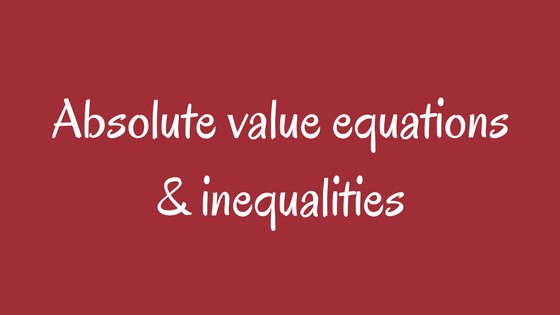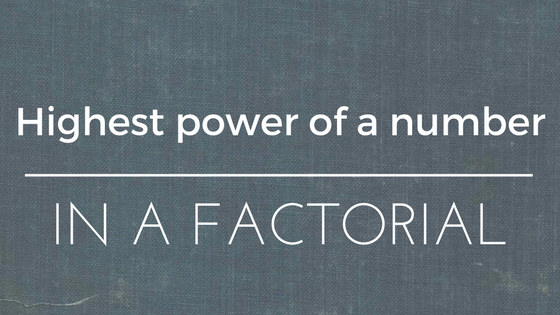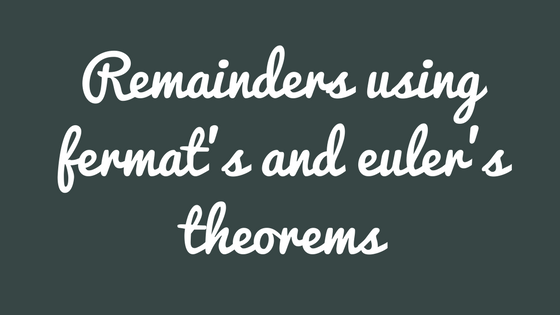
Absolute Value Equations and Inequalities
December 29, 2013
Highest Power of a Number in a Factorial
February 19, 2014Before you check this post, can you answer the number of divisors of 1728. In this post, we have explained a simple technique that will help you not only calculate the number of divisors of 1728 but you will look at the techniques to solve the various kinds of problems on the divisors of a number.
We will first start with understanding the basics and then learn to solve problems based on
- number of divisors,
- number of even and odd divisors,
- sum of divisors,
- product of divisors of any number etc.
Video:
What are Divisors?
For any natural number N, the divisors (also known as factors) are those numbers that divide the number N without leaving a remainder. For example,
- Divisors of 15 are 1, 3, 5, 15
- All divisors of 24 are 1, 2, 3, 4, 6, 8, 12, 24
How to find the Divisors of a number?
The key here is the prime factors of that number. For example, let’s write all the divisors of 24.
24 in terms of its prime factors is expressed as ${2^3}*{3^1}$. As written below, the number of divisors of 24 are 8:
1 = $2^0$ x $3^0$
2 = $2^1$ x $3^0$
3 = $2^0$ x$ 3^1$
4 = $2^2$ x $3^0$
6 = $2^1$ x $3^1$
8 = $2^3$ x $3^0$
12 = $2^2$ x $3^1$
24 = $2^3$ x $3^1$
Now that you have brushed up your basic skills on divisors, let’s look into the formulae used to solve the problems on the divisors of a number along with examples.
Number of Divisors of a number
If N is a composite number such that
$N = a^p * b^q * c^r …$
where, a, b, and c are prime numbers, then the number of divisors of N is given by the formula:
$(p + 1)(q + 1)(r + 1)…$
Example 1: Find the number of Divisors of 18
First lets express 18 in terms of prime factors:
$18 = {2^1}*{3^2}$
Here,
- Consider the exponents of the prime factors of 18.
- The exponents of prime factors 2, and 3 are 1, and 2 respectively.
- Increment each of the exponent obtained in previous step by 1.
- Product of the incremented exponents from step 2 gives the solution to our problem. i.e $(1+1)(2+1) = 6$
Hence the number of divisors of 18 is 6.
Example 1: Find the number of Divisors of 360
360 in terms of its prime factors is expressed as =>
$360 = {2^3}*{3^2}*{5}$
Here,
- Consider the exponents of the prime factors of 360.
- The exponents of prime factors 2, 3, and 5 are 3, 2, and 1 respectively.
- Increment each of the exponent obtained in previous step by 1.
- Product of the incremented exponents from step 2 gives the solution to our problem. i.e $(3+1)(2+1)(1+1) = 24$
Hence the number of divisors of 360 is 24.
Example 2: Find the number of Divisors of 1728
1728 in terms of its prime factors is expressed as =>
$1728 = {2^6}*{3^3}$
Here,
- Consider the exponents of the prime factors of 1728.
- The exponents of prime factors 2, and 3 are 6 and 3 respectively.
- Increment each of the exponent obtained in previous step by 1.
- Using the formula for number of divisors a number as described above, product of the incremented exponents from step 2 gives the solution to our problem. i.e $(6+1)(3+1) = 28$
Hence the number of divisors of 1728 is 28.
Number of Even and Odd Divisors of a number
$360 = {2^3}*{3^2}*{5}$
In this case, except for the exponent of 2, we increment the exponent of all other factors by 1 and take their product along with the non-incremented exponent of 2. Thus we have,
Number of even factors of 360 => 3 x (2 + 1) x (1 + 1) = 18
To calculate the number of odd divisors of 360, ignore the exponent of 2 and take the product of the incremented(increment by 1) exponents of all other prime factors. Therefore,
Number of odd divisors of 360 => (2+1)(1+1) = 6
In general, if N is a composite number such that
$N = 2^p * b^q * c^r …$
where, a, b, and c are prime numbers, then
The Number of Even Divisors or the Even Factors of N is given by
$(p)(q + 1)(r + 1)…$
Example 1: Find the number of even factors of 3360
Express 3360 in terms of its prime factors:
$3360 = {2^5}*{3^1}*{5^1}*{7^1}$
As explained above, to calculate the even factors of 3360, except for the power of 2 we increment the exponent of all other factors by 1 and take their product along with the power of 2.
Thus, the number of even factors of 3360 => 5(1+1)(1+1)(1+1) => 40
Example 2: Find the number even divisors of 10800
10800 in terms of its prime factors is expressed as =>
$10800 = {2^4}*{3^3}*{5^2}$
To calculate the number of even factors of 10800, take the product of power of 2 and other exponents, each incremented by 1
Thus, the number of even factors of 10800 => 4(3+1)(2+1) => 48
Example 3: Find the number even factors of 12600
12600 in terms of its prime factors =>
$12600 = {2^3}*{3^2}*{5^2}*{7^1}$
According to the formula described above, the number of even factors of 12600=> 3(2+1)}(2+1)(1+1) => 54
The Number of Odd Divisors or the Odd Factors of N is given by
$(q + 1)(r + 1)…$
Example 1: Find the number of odd factors of 84
Write down 84 in terms of its prime factors:
$84 = {2^2}*{3^1}*{7^1}$
As explained above, to calculate the odd factors of 84, except for the power of 2 we increment the exponent of all other factors by 1 and take their product.
Thus, the number of odd factors of 84 => (1+1)(1+1)}=> 4
Example 2: Find the number odd divisors of 252
252 in terms of its prime factors =>
$252 = {2^2}*{3^2}*{7^1}$
To calculate the number of odd factors of 252, ignore the of power of 2 and take the product of other exponents incremented by 1
Thus, the number of odd factors of 252 => (2+1)(1+1) => 6
Example 3: Find the number odd divisors of 360
360 in terms of its prime factors => ${2^3}*{3^2}*{5}$
To calculate the number of odd factors of 360, ignore the of power of 2 and take the product of other exponents incremented by 1
Thus, the number of odd divisors of 360 => (2+1)(1+1) => 6
Example 4: Find the number odd divisors of 98000
$ 98000 => {2^4}*{5^3}*{7^2}$
According to the formula described above, the number of odd factors of 98000 => (3+1)(2+1)=> 12
Sum of Divisors of a number
For $N = a^p * b^q * c^r …$, Sum of the divisors of N is given by the formula
$(\frac{a^{p+1}-1}{a-1})(\frac{b^{q+1}-1}{b-1})(\frac{c^{r+1}-1}{c-1})…$
Example 1: Find the sum of divisors of 18
First write down 18 in terms of its prime factors
${2^1}*{3^2}$
Based on the above formula, the Sum of divisors of 18=>
$(\frac{2^{1+1}-1}{2-1})(\frac{3^{2+1}-1}{3-1}) = 39$
Example 2: Find the sum of divisors of 360
First express 360 using its prime factors
${2^3}*{3^2}*{5}$
Now, the Sum of divisors of 360 =>
$(\frac{2^{3+1}-1}{2-1})(\frac{3^{2+1}-1}{3-1})(\frac{5^{1+1}-1}{5-1}) = 1170$
Example 3: Find the sum of divisors of 544
$544 = {2^5}*{17^1}$
Sum of divisors of 544 =>
$(\frac{2^{5+1}-1}{2-1})(\frac{17^{1+1}-1}{17-1}) = 1134 $
Product of Divisors of a number
For $N = a^p * b^q * c^r …$, the formula for product of divisors of N is given by
${N^\frac{x}{2}},\ where\ x\ =\ \frac{Number\ of\ divisors\ of\ N}{2}$
Example 1: Find the product of factors of 360
For 360, we have previously found the number of factors of 360 to be 24. Now, the product of divisors of 360 is
${360^\frac{24}{2}} => {360^{12}}$
Example 2: Find the product of divisors of 512
$512 = {2^9}$
Now, the number of divisors of 512 => 9+1 = 10
Hence, the product of divisors of 512 =>
${512^\frac{10}{2}} => {512^{5}}$
Example 3: Find the product of divisors of 7056
$7056= {2^4}*{3^2}*{7^2}$
The number of divisors of 7056 => (4+1)(2+1)(3+1) = 60
Hence, using the formula of calculating the product of factors, the number of divisors of 7056 =>
${7056^\frac{60}{2}} => {7056^{30}}$
Sum of odd divisors of a number
Now how do we find the sum of odd divisors of a number
This is basically similar to calculating the sum of divisors of a number. Let’s look into this with the help of an example.
How to find the sum of odd divisors of 360?
First express 360 using its prime factors using the formula for sum of divisors of a number:
${2^3}*{3^2}*{5}$
Now, the Sum of odd divisors of 360 is obtained by ignoring the powers of 2 => ${3^2}*{5}$
$(\frac{2^{0+1}-1}{2-1})(\frac{3^{2+1}-1}{3-1})(\frac{5^{1+1}-1}{5-1}) = 78$
What Next?
| Calculate Remainders of Large Numbers | Highest Power of a Number in a Factorial |
| Units digit of Large Numbers | Last Two Digits of Large Number |
Please do try our android app – Math Tricks Workout. The app is developed to improve mental arithmetic using a series of left to right fast math workouts.


2 Comments
product of divisers is a best formulae
Thank you so much sir. It was really helpful. It covers the important aspects of divisors of number for competitive exams.